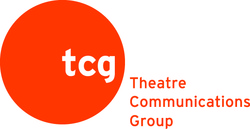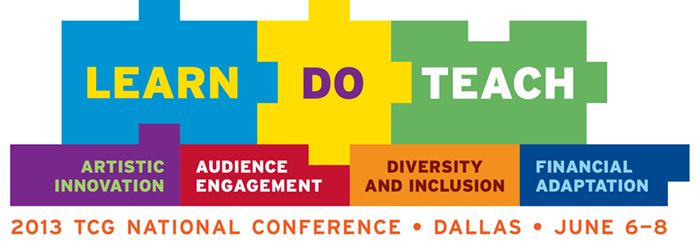 This post is a part of the Diversity & Inclusion blog salon that I led as part of the 2013 TCG National Conference: Learn Do Teach in Dallas. I am re-posting it here on my blog: I left the Diversity and Inclusion Institute completely exhausted, but in the most exhilarating and inspiring way. I was excited for the day ahead and could hardly wait to share what I had experienced in my learning sessions and homerooms. Young Leaders of Color Check-In with Teresa Eyring, Emilya Cachapero and Dafina McMillan I spent the morning writing about the Diversity and Inclusion Institute and then headed to lunch with my fellow TCG Young Leaders of Color. This year was a reunion of sorts, because new leaders had not been added owing to a lack of financial support for the program. As disheartening as that sounds, TCG is smart about how they are using this time. They are assessing on the initial goals of the program, celebrating the extraordinary efforts and achievements of the more than 70 members and working to grow the program in a new and exciting way. More on all of this as it develops, but essentially the program will be shifting from a nomination and spotlight at the conference to a year round program that offers mentorship opportunities and professional development training programs. No doubt, the enthusiasm around this idea was felt throughout the entire state of Texas! For some time, the Young Leaders of Color have wanted to be seen as a resource. One of the major ways we want to be of service is by leading diversity and inclusion training programs in organizations. This way, the burden would not have to be on the people of color in your organization. In our open discussion, the following issues were raised and deeply resonated with me:
Intergenerational Leaders of Color Check-In led by Benny Sato Ambush Following the Young Leaders of Color lunch, I headed to the Intergenerational Leaders of Color check-in led by the incomparable Benny Sato Ambush. It was a rainy afternoon, but the room was densely and beautifully packed. I couldn’t help but smile as more and more chairs needed to be added. However, I immediately saw that the room was not as diverse as it could have been. I saw very few colleagues from Asian, South Asian, Middle Eastern or Native American theatre communities. This served as a reminder to me that when we think about how to be more inclusive within our conversation about diversity, we have to think beyond Black and White. There was a strong Latino contingency, but I wanted more. The major issues raised in this conversation would appear again and again throughout the conference. Here are a few of them:
In a particularly charged moment in the discussion, there was an observation that culturally specific theatres aren’t establishing longer term relationships with artists, specifically playwrights. In response, there was an observation that culturally specific theatres don’t have the finances to compete against the larger theatres for the continued growth and life of the playwright. While I don’t think this is always the case and know of many examples where playwrights have remain invested the theatre while working a day job or even at another theatre, the financial health of the artist is an issue that came up again and again at the conference. Emilya ended the session with two inspiring gems that I had to share and actually use as guiding principles of my work:
Diversity and Inclusion Arc Homeroom: Making Change/Making Meaning - Demographic Shifts Economic Uncertainty and the Role of the Arts This session was phenomenal. It was presented by Dr. Manuel Pastor, director of the Program for Environmental and Regional Equity (PERE) at the University of Southern California. Pastor provided an humorous, enlightening and accessible look at the shifting demographic and cultural currents in our country. Author of numerous books on equity, economics, demographics and social change, Dr. Pastor is also the recipient of many grants and fellowships Danforth Fellow, Guggenheim Fellow and recipient of grants from the Irvine Foundation, Rockefeller Foundation, Ford Foundation, National Science Foundation, Hewlett Foundation, MacArthur Foundation and many more. What’s more, he’s the father of an actor/musician and a dancer. So, this conversation was passionate, informative and personal. These were the major points that spoke to me during his presentation:
Creating a Common Language: The Real Presence of Race in the Artist-to-Artist and Art-to-Audience Relationship Jasmine Guy, actress, writer and producing director of Atlanta’s True Colors Theatre Company and Susan Booth, director and artistic director of Atlanta’s Alliance Theatre spoke candidly about race relations in the rehearsal hall, the organization-to-artist relationship, and in the space between the work and the community. At the start of the conversation, Susan Booth recommended that we all read: It’s the Little Things: Everyday Interactions That Anger, Annoy, and Divide the Races by New York Times veteran Lena Williams. This is an “honest look at the interactions between blacks and whites-the gestures, expressions, tones, and body language that keep us divided.” More than anything, this discussion posited a series of powerful questions that I’d like to share here and would love your thoughts:
If you attended the conference, I’d love to hear your thoughts on these questions and any of the issues address over the course of the day. If you're interested in joining TCG's online year-round conference community, check out Conference 2.0.
0 Comments
Your comment will be posted after it is approved.
Leave a Reply. |
My BlogI'm a playwright, dramaturg, and teaching artist. It is here where you'll find my queries and musings on life, theater and the world. My posts advocate for diversity, inclusion, and equity in the American Theatre and updates on my own work. Please enjoy!
Categories
All
Archives
June 2020
Reading List
|

